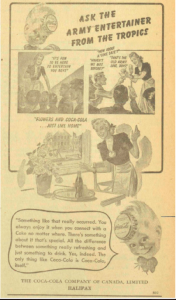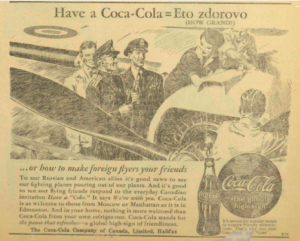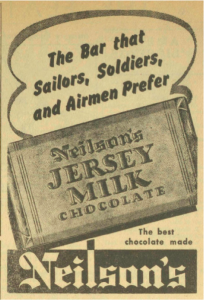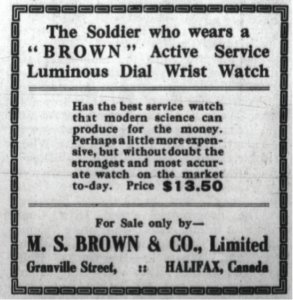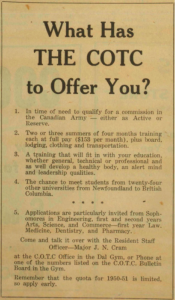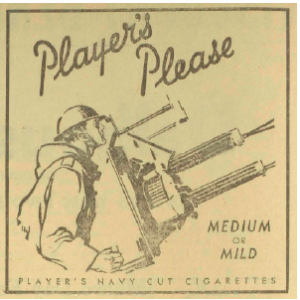
Remembrance Day is almost upon us. This year marks the centennial anniversary of the start of the First World War.
This week, we’ve compiled a selection of archival material that highlights a small slice of the Gazette’s coverage of Dalhousie’s role in the First and Second World Wars, from the exuberant, bombastic attitudes that marked the start of the “Great War” in 1914, to the weary determination to avoid the mistakes of the past when the world again descended into violence in 1939.
Dalhousie Will Do Her Duty: Most Enthusiastic Meeting in the History of the University Takes Preliminary Steps for the Formation of Officers’ Training Corps” –Volume 47, Issue 2 – October 22, 1914
Dalhousie University has taken preliminary steps towards the formation of an Officers’ Training Corps.
At a largely attended and representative meeting in the law library on Friday afternoon last the project was most successfully launched, and everything now points to the establishment at our university of a corps second to none in military efficiency. The meeting was characterized by a magnificent spirit of enthusiasm, in fact the members of the faculty and students present were wrought up to an almost inconceivable pitch of interest which augurs well for the success of the corps.
Eloquent addresses dealing with the responsibility resting on every British subject and particularly on the students of the universities were delivered by President Mackenzie, Chairman Campbell of the board of Governors and Major Thompson. The most striking and impressive feature of the meeting was the practical demonstration of the sincerity of the students in the movement, large numbers of those present signing the membership roll for the projected corps. Altogether the meeting was probably the greatest in the history of Dalhousie University and seemed to awaken all to a vivid realization of the fact that Dalhousie must do her share for the protection and advancement of the interest of our great Empire. And the response from those present proved conclusively that she is more than ready to do her share. The tributes paid by the various speakers to those loyal graduates of old Dalhousie who have already consecrated their lives to the service of the Empire, and have gone to the front were deservedly applauded by the large numbers in attendance.
The law library was filled to the doors when Earle C. Phinney, chairman of the Students’ Council, called the meeting to order shortly after four o’clock. Two members of the fair sex were among the student present and they manifested a keen interest in the proceedings of the meeting.
Mr. Phinney, in opening, outlined the proposals for the establishment of an officers’ training corps. He said that Dalhousians had met to consider a problem that confronted every man in every part of the great British Empire. Already the Government of the Dominion of Canada had taken steps for the formation of a second contingent for foreign service on behalf of Great Britain in the great European war. Several universities of the Dominion had the honor of sending representatives to the front in the first contingent and he was sure that all were justly proud of the men who went from Dalhousie University. He was also informed that Mr. Billman, Dalhousie’s Rhodes Scholar, had joined one of the companies which formed a portion of the fighting forces of the front. While all the students might not go to the front, it was their duty to do something to protect the interests of the Empire. Just what that something should be it was the purpose of this meeting to consider. It seemed to him that there were two propositions open. Men were needed for both home defence and for foreign service, and it remained for the meeting to take action in the matter.
“Quo Vadis (An Editorial)” – Volume 72, Issue 6 – Nov 10, 1939
It borders on the ironical to celebrate tomorrow as Armistice Day. What a tragic farce it has been over the past two decades to pause once a year and rejoice that never again would we degrade our civilization with an international conflict and at the same time pile up the instruments of human destruction at a rate unknown before in history. Now that this course has reached its logical conclusion we may dispense with that ceremony and celebrate tomorrow in remembrance of those who gave their lives in the mistaken hope that their sacrifice would make a catastrophe like the present one impossible.
These men died in vain. The war they fought did not end all wars. They did not make the world safe for Democracy as they fondly dreamed. Saddest of all, they did not free the world from the rule of force, the belief that gave them strength and hope to endure the appalling suffering and boredom of four ghastly years.
It is to these idealists, to the brave and the sincere, that we will pay tribute tomorrow.
(…)
There will be the same brave sacrifices made in the present war as in the last. There will be the same shocking waste of the finest men on both sides. If we are to prove ourselves wiser than the last generation we will not create conditions which in due time will bring on a reoccurrence of misery and horror.
University students have a special task to pay if the era of reconstruction that will follow this holacaust is to be a successful one rather than a repetition of the disastrous mistakes at the end of the first Great War.
Our first task will be to maintain as dispassionate an attitude as possible to the turmoil which surrounds us. As war hysteria mounts it will become more and more difficult to examine things in a sane and objective manner. It was precisely the failure to adopt this attitude that made possible the Carthaginian peace which followed the cessation of hostilities twenty-one years ago. This will be no easy accomplishment, as the institutions we have developed over the last two decades have been made with the express purpose of catering to the mass rather than the individual mind. The dissemination of war propaganda and atrocity stories which forment the frenzy and hatred, making possible a treaty like Versailles, is infinitely easier today than ever before. An honourable settlement will be possible only if reason is allowed to dominate emotion.
(…)
“Dalhousie and the Peace Celebration” – Volume 50, Issue 13 – Nov. 27, 1918
In celebration of the signature of the armistice, staid old Halifax threw aside every shred of her traditional reserve and for forty-eight hours, with few intervals, went completely and joyously insane. Horns blew, bells rang, firecrackers popped and every street was gay with myriad flags and streamers. There were many pleasant little jags, and friendly fights, but the enormous crowds were orderly, and the police were not kept very busy. The two parades on Tuesday were unique in the history of Nova Scotia.
Dalhousie played her part in the celebration. On the historic Monday morning, dozens of students of both sexes joined in the impromptu procession that made Barrington Street resemble New Orleans at the height of Mardi Gras carnival-time. They made quite as much noise as anyone else, which is a very great compliment, and engaged in a fight with a rival cortege which was reminiscent of the days when Dalhousie students were frequently placed on the Crime Book record in the police court.
In the official procession on Tuesday night, a place was reserved for Dalhousie in the line of march, rather too near the rear to suit many of the marchers.
“Dal, King’s Play at War” – Volume 72, Issue 4 – October 27, 1939
Last week’s activity of the C.O.T.C culminated Saturday evening when the northeastern corner of Studley campus became a veritable “No Man’s Land.” Witnessed by hundreds of citizens, who watched the “battle” from Coburg Road, the members of the unit exhibited their skill in arms for more than three hours. The “battle” exhibited all the phases of an actual encounter; the creation of barbed wire barricades; front line trench warfare; advance guards and scouting parties, etc. Commenting on the “battle” Major P.E. Cattley, Commanding Officer of the Unit said, “On the whole, I am pleased with the showing of the members, who, in spite of their short training, conducted the work in a commendable fashion.”
Captain Cameron, distinguished himself by being taken prisoner by an advance party before the battle began.
The activity of the unit this week includes a general parade Monday evening and a general lecture Wednesday evening on “Map Reading” and “Martial Discipline”. Various sections of the platoons will conduct target practise on the miniature range Tuesday and Friday evenings. Sunday, Nos. 1, 2, 3, 4, and 5 Platoons will journey to the Bedford range.
“Walter Melville Billman” – Volume 49, Issue 1— November 15, 1916
Walter Melville Billman was one of Dalhousie’s most brilliant scholars. He entered in 1909 as the winner for that year of the Mackenzie Bursary, and graduated four years later with High Honors in Classics, taking the Governor-General’s Gold Medal. To crown this record he was appointed Rhodes Scholar for 1913, and was at Oxford when he enlisted. He joined the 1st Middlesex Regiment as a Lieutenant. A cable was received on November 5th to the effect that he had been dangerously wounded and was in hospital in France. The following day brought the news of his death. His brother, Ralph, has the distinction of winning the coveted Military Cross.

